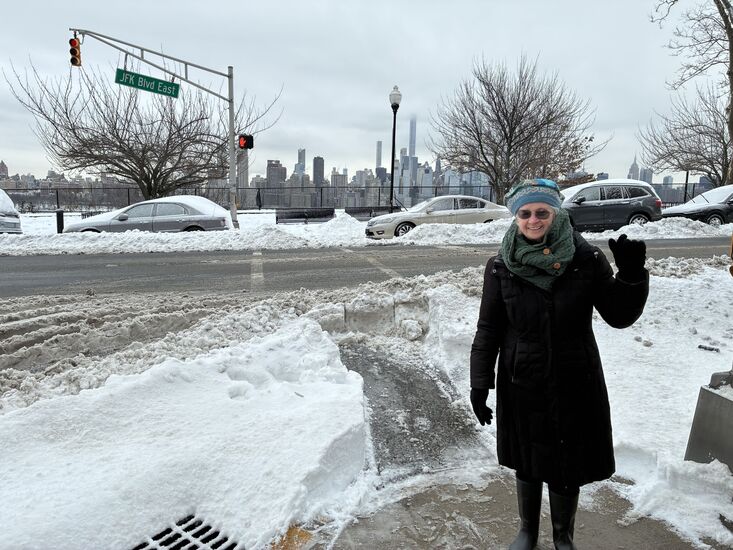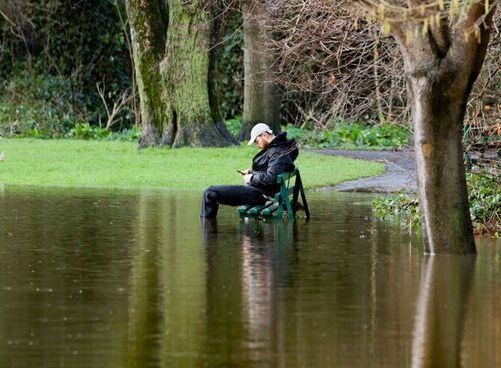Professor Kevin Kenny, the author of "Diaspora," will speak about the Paxton Boys, an 18th-century Pennsylvania militia, at Glucksman Ireland House on Friday evening, April 12, as part of a two-day symposium on the Scotch-Irish. For more details, see the end of this piece. HIGGINSPHOTONYC.COM
Page Turner / Edited by Peter McDermott
“The word ‘diaspora’ is everywhere,” writes Kevin Kenny in the opening line of his most recent book. “It is increasingly widespread in academic, journalistic, political, and popular usage. But what does diaspora mean? Until quite recently, the word had a specific and restricted meaning, referring principally to the dispersal and exile of the Jews.”
Added the Professor of History and Glucksman Professor in Irish Studies at New York University, “In the 20th century, the meaning of the term gradually expanded to cover the involuntary dispersal of other populations, especially Armenians and people of African descent.”
Kenny, who received his PhD from Columbia University, comments a little later, “Problems arise when diaspora is too rigidly defined, but also when its meaning is left open-ended.”
Hence the need for his book.
“Diaspora: A Very Short Introduction,” Kenny told the Echo, “examines a central concept in the study of migration. I argue that diaspora is an idea with three central elements – relocation, connectivity, and return – and I show how migrants, journalists, scholars and policy-makers use this idea to make sense of the world migration creates. While most of my work has concentrated on Irish migration, I broaden the focus in this book to consider Jewish, African, and Asian history alongside the Irish case.”
Former High Commissioner for Human Rights and Irish President Mary Robinson said Professor Kenny’s book is “an excellent contribution to the study of the past, present, and the most all-important future of diasporas – written with remarkable clarity. In a fascinating way, he argues that diasporas transcend territories but can serve to strengthen rather than undermine nation states. Highly recommended.”
Kevin Kenny
Place of birth: Born in London, raised in Dublin
Spouse: Rosanna Crocitto
Children: Michael and Owen
Residence: New York City
Published works: “Making Sense of the Molly Maguires” (1998), “The American Irish: A History” (2000), “Ireland and the British Empire” (editor, 2004), “Peaceable Kingdom Lost: The Paxton Boys and the Destruction of William Penn’s Holy Experiment” (2009), “Diaspora: A Very Short Introduction” (2013).

What is your writing routine? Are there ideal conditions?
I can write in almost any conditions as long as I have a block of time. If I don’t have a suitable amount of time, I prefer not to try. Unlike many writers, I don’t set daily word quotas, and I don’t find it helpful to write for half an hour in an otherwise packed day. But if have a morning, a day, a weekend, or a week to myself, I can accomplish a lot. For me, there are three phases in writing a history book – researching, planning, and drafting – and I approach them sequentially. I gather my materials first, then sift and winnow, and only then do I allow myself to write. Because I plan everything in advance, writing is the least time-consuming of the three phases; the second phase – making sense of my research and organizing it so that I can eventually begin to write – is by far the most time-consuming. As for my daily routine, I write fluently in the morning and I can barely write anything at night.
What advice do you have for aspiring writers?
I train a lot of graduate students and, for the kind of writing we do, I advise them to follow my three-part approach to researching, planning, and drafting [see previous answer]. Producing a top-down outline before they start writing demystifies the process. The more detailed the outline, the less room there is for anything resembling “writer’s block.”
Name three books that are memorable in terms of your reading pleasure.
“The Importance of Being Earnest” – Oscar Wilde’s comic inversion of everything.
“The End of Hidden Ireland: Rebellion, Famine, and Emigration” – Bob Scally’s excavation of a rural community, long hidden from sight, that emerges into visibility during the Great Famine at the moment of its dissolution.
“Crime and Punishment” – perhaps a young person’s book, but the greatest of all philosophical detective novels. I once saw a dramatized version by a Moscow theater company, with Raskolnikov’s axe-wielding conscience getting his own part.
What books are you currently reading?
Sebastian Barry’s “The Secret Scripture” and Cormac McCarthy’s “Blood Meridian: Or the Evening Redness in the West.”
Is there a book you wish you had written?
No.
Name a book that you were pleasantly surprised by.
Every book I enjoy.
If you could meet one author, living or dead, who would it be?
The 17th century philosopher Baruch Spinoza, who appears to have achieved equanimity.
What book changed your life?
A book that changed my life as a historian is E. P. Thompson’s “The Making of the English Working Class” (1963), which I read – all 800 pages of it – when I was an undergraduate. I stand at the tail-end of the generation of historians shaped by Thompson’s call to rescue the downtrodden from “the enormous condescension of posterity.”
What is your favorite spot in Ireland?
West Clare.
You’re Irish if...
...you love the sound of words, especially written words.







